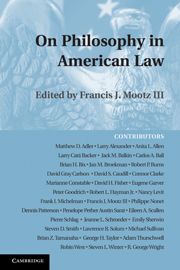Book contents
- Frontmatter
- Contents
- Introduction
- PART I KARL LLEWELLYN AND THE COURSE OF PHILOSOPHY IN AMERICAN LAW
- PART II PHILOSOPHICAL PERSPECTIVES ON LAW
- PART III AREAS OF PHILOSOPHY AND THEIR RELATIONSHIP TO LAW
- 12 On Philosophy in American Law: Analytical Legal Philosophy
- 13 Political Philosophy and Prosecutorial Power
- 14 On (Moral) Philosophy and American Legal Scholarship
- 15 The Aretaic Turn in American Philosophy of Law
- 16 On Continental Philosophy in American Jurisprudence
- 17 Psychoanalysis as the Jurisprudence of Freedom
- PART IV PHILOSOPHICAL EXAMINATIONS OF LEGAL ISSUES
- PART V LAW, RHETORIC, AND PRACTICE THEORY
- PART VI QUESTIONING THE RELATIONSHIP BETWEEN PHILOSOPHY AND AMERICAN LAW
- PART VII COMMENTARIES
- Contributors and Selected Bibliography
- Name Index
- References
17 - Psychoanalysis as the Jurisprudence of Freedom
Published online by Cambridge University Press: 31 July 2009
- Frontmatter
- Contents
- Introduction
- PART I KARL LLEWELLYN AND THE COURSE OF PHILOSOPHY IN AMERICAN LAW
- PART II PHILOSOPHICAL PERSPECTIVES ON LAW
- PART III AREAS OF PHILOSOPHY AND THEIR RELATIONSHIP TO LAW
- 12 On Philosophy in American Law: Analytical Legal Philosophy
- 13 Political Philosophy and Prosecutorial Power
- 14 On (Moral) Philosophy and American Legal Scholarship
- 15 The Aretaic Turn in American Philosophy of Law
- 16 On Continental Philosophy in American Jurisprudence
- 17 Psychoanalysis as the Jurisprudence of Freedom
- PART IV PHILOSOPHICAL EXAMINATIONS OF LEGAL ISSUES
- PART V LAW, RHETORIC, AND PRACTICE THEORY
- PART VI QUESTIONING THE RELATIONSHIP BETWEEN PHILOSOPHY AND AMERICAN LAW
- PART VII COMMENTARIES
- Contributors and Selected Bibliography
- Name Index
- References
Summary
What is the future of legal philosophy? No doubt it has many. But we are betting that jurisprudence will gravitate towards freedom. Freedom, the attribute of the human subject, has largely been absent from legal philosophy. This is a lack that psychoanalytic jurisprudence aims to correct.
THE PSYCHOANALYTIC SUBJECT
All liberal theories start with some intuition of the free, autonomous individual. In contrast, psychoanalysis views the subject's definition as the problem of philosophy.
For psychoanalysis, as reformulated by Jacques Lacan, personality and freedom cannot exist in any empirical or hypothetical state of nature because nature is unfree – bound by ironclad laws of cause and effect. Personality and freedom are artificial creations – hard-won achievements. Subjectivity – the capacity to bear duties and rights – is a stage in this struggle.
What then is the subject? As David Hume argued, the subject is not an affirmative substance but a unity of the memory of perceptions. As such it is not the perceptions but a negativity, the force holding them together. Negativity by its nature cannot be perceived directly, only inferred from what has vanished. Lacan expresses this through his symbol $: the barred or split subject. In Simon Critchley's (2007: 11) formulation the subject is not an individual but a “dividual.”
DYNAMIC JURISPRUDENCE
Because of its negativity, subjectivity is the active principle – the capacity for freedom as spontaneity. Freedom must, however, be given positive existence. This can be done only through law. Subjectivity is a living, breathing contradiction.
- Type
- Chapter
- Information
- On Philosophy in American Law , pp. 139 - 148Publisher: Cambridge University PressPrint publication year: 2009



